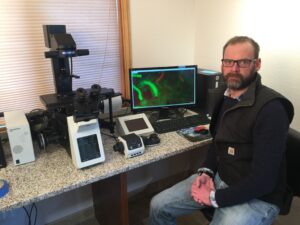By Brain Chemistry Labs
In 2018, cyanobacteria from nutrient-rich waters in Lake Okeechobee were released down the Caloosahatchee River at the same time that red tides were gathering along the Florida west coast, potentially exposing coastal residents to a mixture of toxins.
The releases transported a large bloom of Microcystis cyanobacteria down the Caloosahatchee. Analysis of water samples showed high concentrations of microcystin-LR (commonly called blue-green algae), sufficient to result in adverse human and animal health effects if ingested, based on the known toxicity of this cyanotoxin.
The microcystin liver toxin was being produced by Microcystis, while at the same time, potent neurotoxins called brevetoxin were released from the marine dinoflagellate Karenia brevis (Florida red tide) in the Gulf of Mexico.
In addition, BMAA, a neurotoxin suspected of being linked to neurodegenerative diseases such as ALS and Alzheimer’s disease, was detected in samples of cyanobacteria, dinoflagellates, and diatoms along the Caloosahatchee and west coast. Furthermore, cyanobacterial mats collected on the west coast in 2019 also showed high concentrations of BMAA to be present.
“This study tells us what Florida environmental protection and health officials should have warned us about in 2018: exposure to the toxin-laden waters that were released from Lake Okeechobee and sent down the Caloosahatchee River and St. Lucie Canal were a risk factor for liver cancer and neurodegenerative diseases like ALS and Alzheimer’s,” said Howard Simon, President of Clean Okeechobee Waters Foundation, Inc.
“Sadly, until the pollution of our waters, largely from agri-business and developers, is effectively addressed – and by more than the half-measures trumpeted by the Legislature in this last session — people need to think of exposure to our waters and the risk of neurodegenerative diseases somewhat like smoking: just because you smoke doesn’t mean you will get lung cancer, but it greatly increases your risk,” Simon said.

Together, these new findings highlight the potential for multiple, potentially toxic blooms to co-exist with unknown implications for human and animal health.
“We have been monitoring Florida waters for cyanobacterial toxins since the 2016 emergency release of Lake Okeechobee water down the St. Lucie River and the Caloosahatchee,” reported Dr. James Metcalf, first author and Senior Research Scientist at the Brain Chemistry Labs in Jackson Hole. “We are concerned that cyanobacterial releases from Lake Okeechobee down these two rivers continue to occur.”
Red tides have historically resulted in fish kills and seasonal respiratory irritation along the west coast of Florida, but this new discovery of multiple sources of cyanobacterial toxins occurring at the same time as red tides, requires further investigation, scientists say.
“Together with our colleagues at the Miami Brain Endowment Bank, we have found that chronic dietary exposure of laboratory animals to the cyanobacterial toxin BMAA triggers early Alzheimer’s and ALS neuropathology,” said Dr. Paul Alan Cox, Director of the Brain Chemistry Labs, “but we cannot predict the health impacts of chronic exposures to multiple toxins at the same time.”

This new research, coauthored with investigators at the Sanibel-Captiva Conservation Foundation and the Calusa Waterkeeper in Fort Myers, appeared this week in Neurotoxicity Research.
Brain Chemistry Labs is an independent non-profit research institute based in Jackson Hole, Wyoming. With five PhDs on staff, it anchors a consortium of 50 leading scientists from 28 institutions representing 12 different disciplines.
“The Invading Sea” is the opinion arm of the Florida Climate Reporting Network, a collaborative of news organizations across the state focusing on the threats posed by the warming climate.



